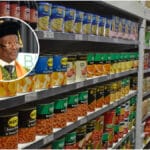Launches a state-of-the-art milling facility
Wheat and maize milling company, Bokomo together with other millers from the Botswana Millers Association have committed to procure all the locally produced wheat and maize.
This was revealed by the company Managing Director this week, Werner De Beer during the unveiling of the company’s latest sorghum plant.
According to the MD, Bokomo also strives to reduce import taxation by producing and supplying local quality products.
Furthermore, he said Bokomo is contributing towards the achievement of national and the growth of the national economy through the improvement of food security.
As such, it has invested in state-of-the-art production facilities as well as partnering with Botswana Agricultural Marketing Board (BAMB and Ministry of Agriculture and Food Security.
Bokomo which employs around 800 locals is also contributing to Small Medium Enterprises (SME) development, according to De Beer, as it has partnered with commercial banks such as Absa, Stanbic and FNBB.
Meanwhile, speaking at the launch of Bokomo new plant, Vice President Slumber Tsogwane said Bokomo has positioned itself along the sorghum value chain, saying value chains present an opportunity and potential to diversify the local economy.
He noted that the future of agriculture lies in the exploration of agro-processing and urged others that can claim a stake in this potential opportunity to do likewise.
The VP highlighted Bokomo’s contribution towards the reduction of the import bill as well as improvement of food and nutrition security both at household and national levels, something which he said will contribute to economic growth.
Botswana’s annual import bill currently stands at over P60 billion annually with commodities imported including mainly fuel, food, beverages and tobacco, machinery and electric equipment, chemical and rubber products as well as vehicles.
Most of these goods are sourced from South Africa which accounts for close to 70 percent of imported goods.
While the import bill remains high, the government has in its effort to reduce it, enacted some Acts to protect local producers.
One of those is the Control of goods, prices and other Charges Act which affords some protection to local millers and the Act requires that before traders can import some processed agricultural produce they have to buy 70 percent of their requirement locally.
In 2018, the trade ministry banned the importation of both cement and bottled water in small quantities.
All this which is put in place through the same Act, was aimed at growing the local economy as well as creating job opportunities.















